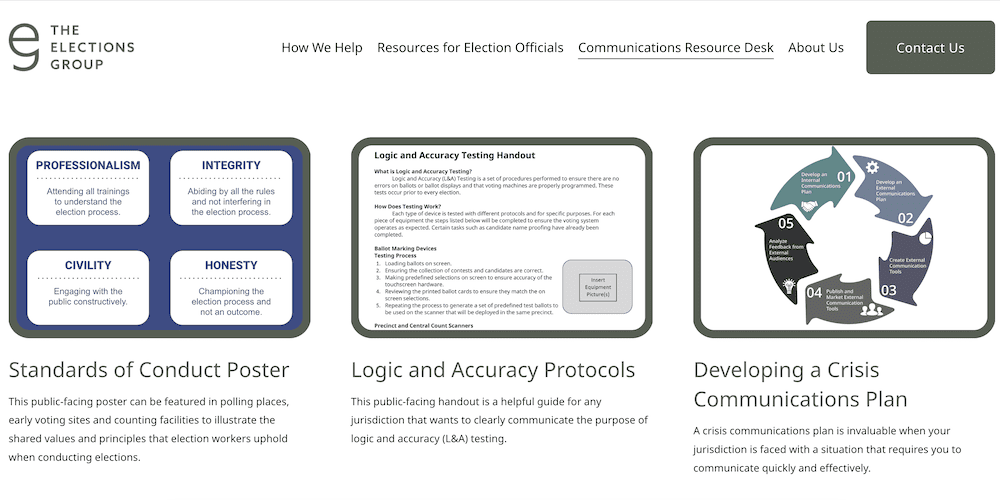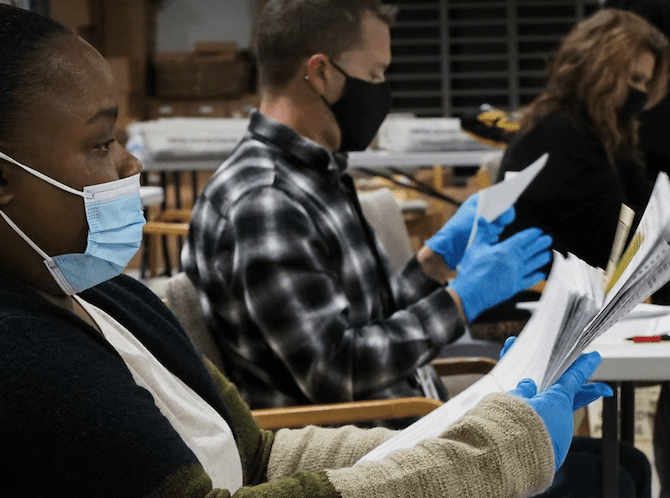Election Deniers and Election Defenders Poised for Next Phase of Voting Wars

(Tools for election defenders. Screenshot via www.electionsgroup.com/communications-resource-desk)
There is little doubt that pro-Trump Republicans are going to challenge voters and contest results that they do not like in 2022’s general election. And should they lose those challenges and contests, they are not likely to accept the results.
The warning signs are everywhere.
There are recruitment drives to challenge voters and voter registrations. There are instructions to disrupt the process and counting of votes. There are assertions not to trust any vote-counting computer. Some general election candidates are already claiming that the results will be rigged unless they win.
Election officials and their defenders are anticipating these actions. They have written and shared guides on how to deal with subversive poll workers and unruly party observers. Election officials have been urged to build relationships with the press before crises hit, and tell stories about “friends and neighbors” who run the process to build trust. They are being reminded to bolster cybersecurity, be calm and professional, and use posters and handouts that explain the process.
But as the November 8, 2022, Election Day nears, it appears that the people most likely to be attacking and defending the process are, in many respects, talking past each other. What the critics are seeking—a level of simplicity and transparency in the vote-counting protocols and rules—is not what is being teed up and offered to the public in defense of the voting to come.
“In a lot of these close races, the margins are not going to be close enough for a recount, but close enough that the election deniers will be able to attack the results,” said Chris Sautter, an election lawyer who has specialized in post-election challenges and recounts since the 1980s. “The margin that triggers recounts is much smaller than the margin that will trigger attacks.”
Stepping back, a key question that has hovered over the investigations by the House Select Committee to Investigate the January 6 Attack on the U.S. Capitol remains: How much can the electoral system be stressed before it breaks, whether from disruptions, disinformation, partisan interference, or something else that is unexpected but swirls out of control later this fall?
“We will soon find out if American democracy is robust enough,” concluded the New Yorker’s Sue Halpern, in an October 4 report that detailed how “Republican-led legislatures and right-wing activists alike are making things more difficult for election officials.”
The Coming Attacks
There have been no signs in recent months that pro-Trump Republicans have tempered their belief that the 2020 presidential election was stolen. Instead, there are ample signs that their mindset is becoming more belligerent.
In early August, after the FBI raided the ex-president’s home in Mar-a-Lago to retrieve secret documents that should not have left the White House, there was an uptick in social media posts threatening a coming “civil war.” On August 29, Trump again cited baseless 2020 conspiracies and demanded a new election.
Trump loyalists and copycat candidates have built on these sentiments.
Matt Braynard, an ex-Trump campaign staffer whose claims that voter fraud tilted the 2020 election have been debunked by media fact checkers, nonetheless announced plans on October 5 to “challenge votes” in nine battleground states—Arizona, Florida, Georgia, Nevada, North Carolina, Ohio, Pennsylvania, Virginia, and Wisconsin—and is recruiting volunteers.
Days before, at an October 1 forum in Arizona, Shawn Smith, a retired Air Force Colonel, member of the mob that stormed the U.S. Capitol on January 6, 2021, and president of Cause of America, another election-denying group, told the audience that no voting system computer is reliable. “The people telling you they are secure are either ignorant or lying,” he said, before naming 10 of the nation’s top election regulators, election administration experts, and voting industry spokespeople. These experts are some of the same people now advising local election officials on how to respond to threats this fall.
Jim Hoft, the founder and editor of the Gateway Pundit, a pro-Trump website that has championed Trump’s false stolen election claims and sees the January 6 insurrectionists as heroes, has gone further. On October 3, his site published an “action list… to save our elections from fraud,” whose instructions include urging party observers inside election offices to “escalate,” “disrupt,” or “require a temporary shut-down of the faulty area” if they see anything suspicious. The action list also recommended that postal workers should be followed, “incident reports” should be prepared, and lawyers should “[f]ile lawsuits demanding oversight.”
“Patriots must register as poll workers, observers, and get involved,” Hoft wrote. “But we must do more.”
Meanwhile, candidates who have embraced Trump and his “big lie,” such as Arizona GOP gubernatorial nominee Kari Lake in her August primary or New Hampshire GOP U.S. Senate nominee Don Bolduc on October 10, said the vote count was rigged in 2020 and was likely to be rigged again this fall.
“And as long as we have this type of fraud and irregularities that are susceptible to our system across this country, we are going to be in big trouble,” Bolduc told a radio interviewer. “So, it’s less about whether we focus on 2020[’s] stolen election and [more about] how we focus on how we’re going to win in 2022 and [that we] don’t let it happen.”
Arming Election Defenders
Meanwhile, nearly a dozen organizations—from federal agencies tasked with cybersecurity, to nonprofits specializing in voting rights and running elections, to professional organizations of election administrators, to consulting firms staffed by former election officials—have been preparing and sharing guides, tools, and taking other steps to defend the process and the 2022 general election’s results.
“Thanks to the folks at… [the Alliance for Securing Democracy,] Brennan Center, Bipartisan Policy Center, Bridging Divides Initiative, Center for Election Innovation & Research, Center for Tech and Civic Life, CISA [U.S. Cybersecurity & Infrastructure Security Agency], The Elections Group, National Association for Media Literacy Education, and National Association of State Election Directors for all the work they’ve done for elections officials and for providing the resources here,” wrote Mindy Moretti, editor of Electionline.org, a news and information hub for election officials, in an October 6 weekly column that listed and linked to more than 40 publications, guides, and other resources.
The topics covered include audits, communications, cybersecurity, election management, election security at polls and operations centers, legal advice, mis/disinformation, insider threats by election workers, poll worker security gaps, de-escalation techniques, nonconfrontational training strategies, standards of conduct for election workers, testing voting systems, voting by mail, and more.
The “De-Escalation Guidance for Poll Workers,” from Princeton University’s Bridging Divides Initiative, for example, emphasizes planning, training, and monitoring one’s responses.
“Familiarize yourself with federal and state laws and guidance on polling place disruptions and unauthorized militia,” it said in its section on planning. “Remember the goal is not to win an argument but to calm verbal disruptions and prevent physical disruptions,” it advised as part of its training guidance. “While de-escalating don’t: order, threaten, attempt to argue disinformation, or be defensive.”
“As trite as it sounds, you need to take control of the ‘narrative’ before it takes control of you,” wrote Pam Fessler, a former National Public Radio reporter who covered elections for two decades there, in “Telling Our Story: An Elections Communications Guide,” written for the Elections Group, a consulting firm run by former election officials.
“Of all the stories you have to tell, the most important one is this: ‘Our elections are safe and secure, and run by Americans you can trust,’” Fessler’s communications guide said. “It’s about feelings and belief, more than numbers and facts. Those who question the legitimacy of elections refer to what they believe are ‘facts’ about voting discrepancies, but their appeal is largely emotional: ‘People are trying to steal our elections; we need to take our country back.’”
“You can counter by appealing to these same emotions—patriotism, desire for freedom and civic pride,” it continued. “You might even find common ground. Many of those who question the voting process believe they too are defending democracy and that if they don’t, they risk losing control of their lives.”
Ships in the Night?
Arguably, the country has not seen as wide an array of proactive measures among election officials to anticipate and counter potential disruptions and propaganda. In 2020’s general election, the focus concerned implementing new protocols that surrounded mailed-out ballots and safer in-person voting—as COVID-19 vaccines were not yet available—and cybersecurity to protect voter and ballot data.
However, what is not emphasized in these tools is what some pro-Trump Republicans say that they have been specifically seeking, which is easily understood evidence that results are accurate. That desire is behind their movement’s push for states to stop using vote-counting computers and to count all ballots by hand.
Pro-Trump legislators in six states (Arizona, Colorado, Missouri, New Hampshire, Washington, and West Virginia) introduced bills in 2022 to ban these computers. A handful of rural towns and counties have put forth measures to require hand counts and a few have passed, including in Nye County, Nevada, a swing state. Candidates such as Arizona’s gubernatorial nominee Lake and GOP secretary of state nominee Mark Finchem have sued to require hand counts. (They lost in court in September rulings but have appealed.)
Beyond studies that have also shown that electronic vote-count systems are more accurate than hand counts (which are error-prone due to their repetitive nature and can take days to complete), the current timelines in many states between Election Day and when the official results must be certified do not accommodate hand counts—especially in states where millions of ballots are cast.
Moreover, the margins in state law that trigger recounts (which come after the results are certified) are generally 1 percent or less. That volume is much smaller than the volume of votes that pro-Trump Republicans have claimed were suspect in 2020—even though they never offered any proof that was accepted by a court.
Thus, while election officials and their defenders might be preparing to convince reasonable Americans that the voting and counting is accurate and legitimate, it appears that pro-Trump Republicans who did not accept 2020’s results will not find much to be reassured by—since their movement’s self-appointed IT experts continue to say that election system computers cannot be trusted.
These factors and seemingly irreconcilable views are poised to collide after November 8. This is why growing numbers of pundits are starting to ask aloud if the system will hold under the coming stress test from election deniers.
“Until we are able to return to the point where the losing side accepts the vote count as valid, we’re going to be trapped in a world of election wars,” said Sautter. “Of course, transparency, public oversight, and public access are paramount to restoring faith in our elections so that we can get to that point.”






